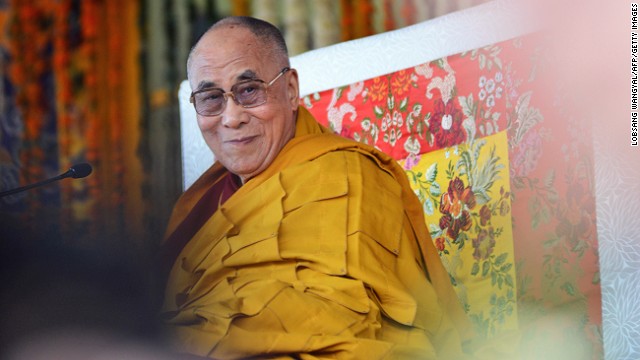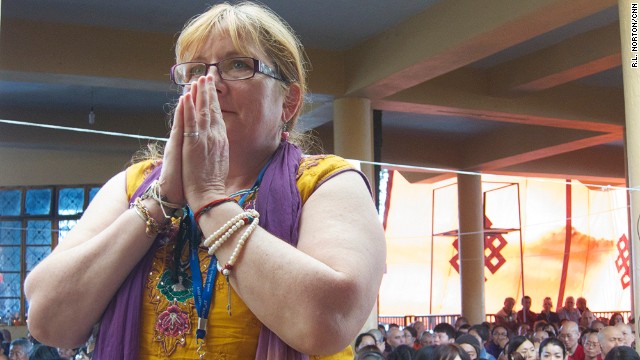 Tibetan spiritual leader the Dalai Lama gives teachings around the world throughout the year including at his residence, Tsuglakhang temple in McLeod Ganj, Dharamsala.
Tibetan spiritual leader the Dalai Lama gives teachings around the world throughout the year including at his residence, Tsuglakhang temple in McLeod Ganj, Dharamsala.  Locals call McLeod Ganj "Little Lhasa." It's also the home of the self-declared Tibetan government in exile.
Locals call McLeod Ganj "Little Lhasa." It's also the home of the self-declared Tibetan government in exile.  Thousands of monks flock to Dharamsala to hear the Dalai Lama's teachings on wisdom and compassion.
Thousands of monks flock to Dharamsala to hear the Dalai Lama's teachings on wisdom and compassion.  For some, a handshake with the Dalai Lama is an experience of serenity followed by giddy childlike joy.
For some, a handshake with the Dalai Lama is an experience of serenity followed by giddy childlike joy.  "Our whole world is interconnected and the global economy is concerned with the whole world and not only individuals," the Dalai Lama says. His deep, roaring laugh brings a smile to everyone's face.
"Our whole world is interconnected and the global economy is concerned with the whole world and not only individuals," the Dalai Lama says. His deep, roaring laugh brings a smile to everyone's face. Teaching in Tibetan and sometimes English, the Dalai Lama speaks about the importance of secular ethics, universal human values, inter-religious harmony climate change and preserving Tibetan culture.  There's a large choice of yoga workshops, dream catcher classes and Ayurvedic cleansing programs in surrounding communities.
There's a large choice of yoga workshops, dream catcher classes and Ayurvedic cleansing programs in surrounding communities.  Evidence of the Dalai Lama's teachings are seen on the streets, in coffee shops, internet cafes and book stores throughout the nearby hill communities.
Evidence of the Dalai Lama's teachings are seen on the streets, in coffee shops, internet cafes and book stores throughout the nearby hill communities.  While the culture of the towns, Dharamsala and McLeod Ganj, are predominantly Tibetan Buddhist, the small surrounding villages are more Indian and have a hippy vibe.
While the culture of the towns, Dharamsala and McLeod Ganj, are predominantly Tibetan Buddhist, the small surrounding villages are more Indian and have a hippy vibe.  Despite living the simple life, many monks can be seen with technology such as smart phones.
Despite living the simple life, many monks can be seen with technology such as smart phones.  Followers visit from more than 60 countries and simultaneous translation machines are given out at the teachings.
Followers visit from more than 60 countries and simultaneous translation machines are given out at the teachings.  All visitors must register with the Tibetan Branch Security Office in McLeod Ganj near Hotel Tibet or at the temple first.
All visitors must register with the Tibetan Branch Security Office in McLeod Ganj near Hotel Tibet or at the temple first.
- Visiting Dalai Lama in his residence just above Dharamsala is considered a pilgrimage for some
- Monks and followers from more than 60 countries attend his public teachings
- Dharamsala is predominantly Tibetan Buddhist while surrounding villages are more Indian and have a hippy vibe
(CNN) -- The path to Enlightenment, as any spiritual seeker will testify, can be long and difficult.
Unless you take a shortcut.
Whether a trip to the McLeod Ganj just above Dharamsala in northern India -- the hometown of the Dalai Lama -- offers an easy route is open to question.
For many reaching the seat of the Dalai Lama and current home of the self-declared Tibetan government-in-exile is part of a quest for true happiness and a more altruistic way of life.
For some, it's a journey motivated by political activism.
And for others, it's simply a port of call on India's hippy trail.
I'm heading there to witness one of the Dalai Lama's teaching sessions.
The Tibetan spiritual leader holds these around the world throughout the year, but to attend one at his own temple in Dharamsala is considered by many to be nothing short of a pilgrimage.
'Little Lhasa'
Leaving Pathankot station on the overnight train from Delhi, I meet Lobsang Rabten, a 27-year-old exiled Tibetan monk, currently based at The Sera Jey Monastery in Southwest India.
Like thousands of others he's on his way to listen to a three-day teaching on wisdom and compassion.
We share the two and a half hour taxi ride up through winding hill roads, dense forests and sparsely populated towns.
As we approach the McLeod Ganj suburb of Dharamsala or "Little Lhasa" as the locals call it, the traditional orange robes of Tibetan Buddhists stand out in ever-greater numbers along the bustling, narrow streets.
"The Dalai Lama's compassion teachings give me strength," Rabten says as he leans out the window to enjoy the cool mountain air.
"That is to say I can feel all sentient beings to be the same as me in their desire for happiness and to reduce suffering."
With people from more than 60 countries and simultaneous translations in dozens of languages, the event feels like some kind of global congress.
Exiled Tibetan monk, Lobsang Rabten, 27, says: "The Dalai Lama's compassion teachings give me strength."
Burning incense
During the event, the Dalai Lama appears each morning at 8 a.m., led by plain clothes armed policemen and followed by a small entourage of a handful of monks carrying pots of burning incense.
He makes his way through the temple courtyards, up two flights of stairs and through the back of the main hall.
Those who get to shake his hand -- I'm one of them -- talk of an overwhelming feeling of peace and calm followed by a giddy, childlike joy.
Lisa Heath, a 62-year-old sculptor from Massachusetts describes her brief encounter as "simply divine."
Speaking in Tibetan and sometimes English, the Dalai Lama begins the first day with a recap on the importance of secular ethics, universal human values, inter-religious harmony, climate change and the importance of preserving Tibetan culture.
Young monks quietly weave their way through the solemn crowds with large, metal jugs of butter tea and warm bread.
"Our whole world is interconnected and the global economy is concerned with the whole world and not only individuals," the Dalai Lama says, following his comment with by a deep, roaring laugh that brings a smile to everyone's face.
The importance of connection or belonging to a greater whole was evident not only at the teachings but throughout the small hilltop communities in the area.
Touring the neighborhoods
Amid peace poles, sacred cows and rows of vendors selling everything from mala prayer beads to crystals and macrame, the temple crowds dissipate.
Many of the younger travelers make their way back up the rocky paths to nearby hillside communities of Bhagsu and Dharamkot at the end of the day.
Along the way, it's almost impossible to walk past a coffee shop, internet cafe or book store without seeing posters of the Dalai Lama and slogans calling for a free and independent Tibet.
While the culture of the towns, Dharamsala and McLeod Ganj, are predominantly Tibetan Buddhist, the small surrounding villages are more Indian and attract an international hippy crowd.
In Upper Dharamkot, a village so heavily populated by Israelis even the shop signs and menus are written in Hebrew, there's a large choice of yoga workshops, dream catcher classes and programs in Ayurvedic cleansing -- an ancient natural healing technique in India.
The Jewish community organization Chabad House (Dharamkot village, Mcleod Ganj; +91 1892 221005), has one of the largest buildings in town partly to ensure spiritual experimentation does not lead to religious desertion.
A typical Friday night dinner here sees hundred of Israelis eating and praying together.
A break from the all the spiritual adventure can be found at the Trimurti Garden Cafe (Bhagsunag, Mcleod Ganj; +91 98 1686 9144) in Lower Dharamkot, a little oasis serving the best carrot cake and vegan chocolate cake in the area.
How to attend the sessions:
All visitors must register with the Tibetan Branch Security Office in McLeod Ganj near Hotel Tibet or at the temple first. Registration opens only three days before the teaching.
Travelers are required to bring two passport size photos and copy of their passport. Attendance passes are issued on the spot and cost less than 50 cents each. More details can be found here: http://ift.tt/1w7a7A5.
The Dalai Lama offers teachings at Dharamsala a few times every year but also in different places.
The next public lectures in Dharamsala are from November 11-13 and December 2-5.
Find out where the Dalai Lama is going next here: http://ift.tt/1awkgQ6
Robert Norton is a writer, photographer and former Reuters correspondent. He has written for The Sunday Times, The South China Morning Post, Wired and The Times Literary Supplement.